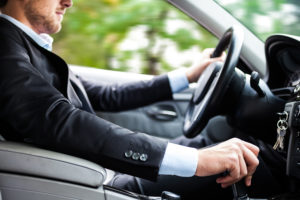 The Uber car service company uses innovative technology that “connects you with a driver at the tap of a button.” Now administrative law judge Harris Adams of Denver has proposed that the government forcibly stop Uber from using such technology—a ruling that may drive the company out of Denver, the Denver Post reports.
The Uber car service company uses innovative technology that “connects you with a driver at the tap of a button.” Now administrative law judge Harris Adams of Denver has proposed that the government forcibly stop Uber from using such technology—a ruling that may drive the company out of Denver, the Denver Post reports.
“Uber contracts with limo companies for its service and issues drivers iPhones, which they use to help determine fees,” the Post reports.
On the pretext of “consumer protection,” Adams proposes, “A luxury limousine may not contain a taxicab meter or other device for calculating any component of rates charged based upon time and mileage, other than a clock.” Uber can appeal these “recommendations,” the Post notes, and a “three-member Colorado Public Utilities Commission [PUC] would ultimately decide whether to adopt the new rules.”
 It is outrageous that a city judge and city bureaucrats can limit Uber’s use of technology to serve the company’s clients—all of whom happily sign up for the service, and all of whom are free to stop doing so whenever they please.
It is outrageous that a city judge and city bureaucrats can limit Uber’s use of technology to serve the company’s clients—all of whom happily sign up for the service, and all of whom are free to stop doing so whenever they please.
Although the government today unfortunately owns and controls the roads, this doesn’t give the government the right to forcibly restrict competition among companies offering car services.
Best wishes to Uber in fighting these absurd government controls. If Adams and the members of the PUC do not wish to ride in Uber cars, they are free to abstain from doing so. But they have no right to tell the rest of us that we cannot hire Uber cars—or to tell Uber that it cannot use the latest technological advances in offering its services. Adams’s ruling is shameful—as are the regulations on which it is based. May the former be overturned, and may the latter be repealed.
Like this post? Join our mailing list to receive our weekly digest. And for in-depth commentary from an Objectivist perspective, subscribe to our quarterly journal, The Objective Standard.
Related:










